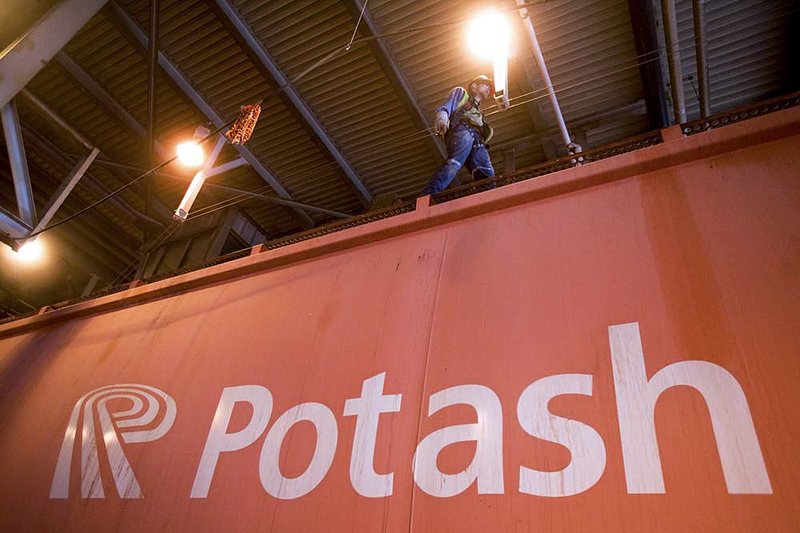SASKATOON, Saskatchewan — A mile under the prairies of Saskatchewan lie the world’s biggest reserves of potash, a fertilizer ingredient critical to the global food supply. It’s why they call the Canadian province the Saudi Arabia of potash.
These days the question of who should own the buried riches is gripping Canadians’ attention. Potash Corp., the company with rights to more than 50 percent of the reserves, is fighting a hostile bid by Anglo-Australian BHP Billiton, the world’s largest mining company, amid accusations that a vital Canadian industry is threatened with “a foreign takeover.”
The government of Prime Minister Stephen Harper is expected to decide by Wednesday whether the biggest takeover bid in Canadian history can go ahead, and the nation faces a dilemma. On the one hand, it firmly believes in the free market. On the other, it’s rare and risky for a federal prime minister to overrule a provincial premier, and Saskatchewan’s premier, Brad Wall, is dead-set against the takeover.
Potash Corp., the target of the $38.6 billion takeover bid, says the Australian offer is laughably low, but worries that if it goes forward it would foreclose on better offers at a time when demand from China and other developing nations for the crop-improving substance is sure to push up prices.
While the company hasn’t specifically rejected a takeover, Wall’s mind is made up regardless of whether the offer price goes up.
“Consider what is at stake in terms of potash,” the Saskatchewan premier said in a speech when he formally rejected the bid. Urban spread and population growth are reducing farmland, populations are hungrier for protein-rich diets, and “this amazing nutrient we have in such great abundance in the province, this potash, is going to be in greater supply. It is a strategic resource. And we should act like it. The country should act like it.”
He estimates that Potash Corp. controls 25 percent to 30 percent of world supply. “What other takeover involves 25 to 30 percent of the world’s anything?”
Wall’s office is running a vigorous campaign for Canadian hearts and minds. One media release cites the Australian company’s former chairman, Don Argus, quoting him as having once warned that by ceding too many resources to foreign control, Australia risked becoming a “branch office - just like Canada.”
Opposition to the deal is gaining steam as the premier of neighboring Alberta - the most conservative province of Canada and Harper’s home province - has come out against it.
Harper has not made his intentions clear, and his record on the issue offers few clues. His government has allowed foreign takeovers in Canadian oil production, which is also regarded as a strategic industry but in 2008 it blocked a U.S. company’s takeover of the space and satellite division of MacDonald, Dettwiler and Associates Ltd., Canada’s leading space-technology firm - the first time the 1989 law on takeovers has been used in that way.
In the potash case, Harper seems to be questioning whether Potash Corp. is truly Canadian. Last week he was at odds with Wall when he described the deal to Parliament as a “proposal for an American-controlled company to be taken over by an Australian controlled company.”
Potash Corp.’s headquarters is listed as being in Saskatchewan, but the chief executive and many top executives are Americans who live and work in the Chicago area, and Harper’s spokesman said the head office is in Illinois.
Potash Corp. was created by the Saskatchewan government in 1975 after the government nationalized many smaller U.S. potash companies based in the province. It was privatized in 1989.
Wall says he expects Harper to block the takeover, while Andrew Mackenzie, a senior BHP executive, is optimistic it will pass. Canadian law says a foreign takeover can be stopped if it isn’t a “net benefit” to Canada, and Wall believes Saskatchewan, for whom potash-related revenue is 15 percent of its budget, will lose out financially.
While oil is Saskatchewan’s biggest earner, potash sales spiked to $7 billion in 2008 before falling back to $3 billion as the global economic crisis hit.
Mackenzie says BHP can make Potash Corp. more profitable and therefore boost the royalties Saskatchewan collects on the potash, which lies some 3,000 feet below the surface, left over when ancient seas dried up.
Even if the government approves the deal, it has to get past the shareholders. Forty nine percent of the shares are owned by Canadians, 38 percent by Americans, and 13 percent by others.
One fierce critic is Montreal-based billionaire investor Stephen Jarislowsky, Potash Corp.’s third-largest shareholder. He said that BHP’s $130 bid is too low and that anyway, Canada shouldn’t sell another major company to foreign interests.
“I’ve never seen a country as stupid as ours,” Jarislowsky told The Associated Press. “If you want to keep head-office cities, and if you want to keep a Canadian stock market in which pensions invest, you can’t just sell all your companies out. How dumb can you get? And I don’t know any other country, including Australia, that would sell Potash.”
There is a wide expectation that BHP will increase its bid if it wins government approval. Potash Corp.’s stock has traded for between $140 and $153 a share since its directors rejected BHP’s $130 offer as wholly inadequate in August. Potash shares had soared to more than $230 just before the global recession hit in 2008.
Potash Corp. reported Thursday that its third-quarter profits jumped 62 percent to $402.7 million, or $1.32 a share, the second-highest earnings for the quarter in the company’s history. The company said the results support its view that BHP’s bid is too low. But shares of the company fell almost $4.79, or 3.25 percent, to $142.53 in trading on the New York Stock Exchange on speculation BHP’s bid will be blocked by the federal government.
Business, Pages 29 on 10/29/2010

